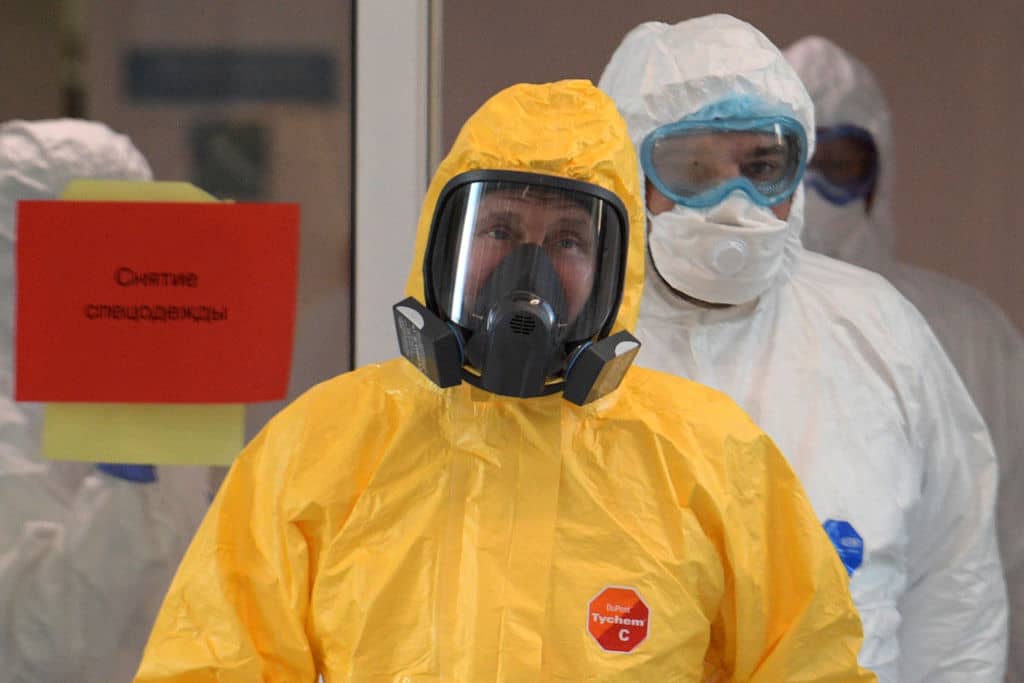Although he has been vaccinated, Vladimir Putin is self-isolating for at least a week after ‘dozens’ in his entourage came down with Covid. He is apparently showing no signs of being infected. And perhaps no wonder, as even by the standards of his usual presidential protection, since the start of the pandemic Putin has been shielded within a formidable bio-security regime.
Those due to meet him face-to-face are tested, required to isolate beforehand, and – if visiting him either in the Kremlin or his mansion outside Moscow – has to pass through a tunnel fogged with aerosolised disinfectant and bathed in germ-killing ultraviolet light.
Back in March last year, he wore a full hazmat suit to visit Moscow’s main coronavirus hospital, which looked a little excessive, but then removed his gloves to shake hands with its chief doctor, Denis Protsenko. When Protsenko then came down with Covid, Putin all but stopped his public appearances. Instead, he retreated into managing the country by video-conference.
Putin is the ‘decider-in-chief,’ the final arbiter of the frequent and bitter disputes which erupt between the grandees of the president’s court
One can question whether this was good for Russia in terms of day-to-day governance. It means he is even more dependent on the presidential administration for news about the country (and there is some debate as to how much they tell him). But it also brought to the forefront the degree to which the elite – not all of whom actually feel any fondness for him – realise they have to be concerned about his health.
Putin appears physically healthy for his age, and is known to swim every day. He also continues to engage in bouts of judo and often-bruising ice hockey games. Nonetheless, he is still 68 years old, and coronavirus has proven to be unsparing and unpredictable in its effects.
In any case, this is not simply about the understandable caution of a man facing a virus that preys disproportionately on the older generations. It is also a crucial national security issue for Russia.
Putin has become, after all, the keystone of the current, personalistic system. There are other politicians and public figures, but they are in many ways defined by their relationships with, proximity to, and influence over the man his entourage simply refer to as ‘the Body.’
He is often strikingly hands-off in his style of leadership. Contrary to the myth of Putin as the grand master of geopolitical chess, he prefers to set broad and even ambiguous objectives for policy and let his ministers, officials and sundry ‘political entrepreneurs’, from oligarchs to media moguls, scurry around trying to find ways to please the boss.
The thing about this kind of ‘adhocracy’ – which can be very effective – is that it depends on the ultimate and unquestioned authority of the figure at its heart. It relies on Putin as the ‘decider-in-chief,’ the final arbiter of the frequent and bitter disputes which erupt between the grandees of the president’s court.
There have been times when Putin has dropped out of sight. Sometimes, this may have been for medical reasons – he reportedly has recurring back problems. At others, it is because he is dodging or putting off a tough decision, such as when gunmen murdered opposition politician Boris Nemtsov in 2015. Even a couple of weeks, though, is enough to get rumours flying: he’s dead, he’s had a stroke, there’s been a coup, whatever.
For a president whose public persona is still so tightly bound to his image as a virile, energetic chief executive, a serious illness – especially one which could have debilitating long-term consequences – would be a real political blow.
For a system which has come to depend on him, though, it could be devastating – especially with parliamentary elections beginning on Friday. The constitution mandates that the prime minister becomes acting president if need be, but current premier Mikhail Mishustin lacks the status to fill the gap. He receives good approval ratings from the public, yet this is essentially as a competent technocrat: the prime minister is the president’s chief administrator, not his stand-in.
Putin’s absence, especially if he were in no state to manage any transition, could trigger struggles for power within the elite, as well as embolden the system’s critics and Russia’s foes. No wonder he is kept in such a careful cocoon.







Comments